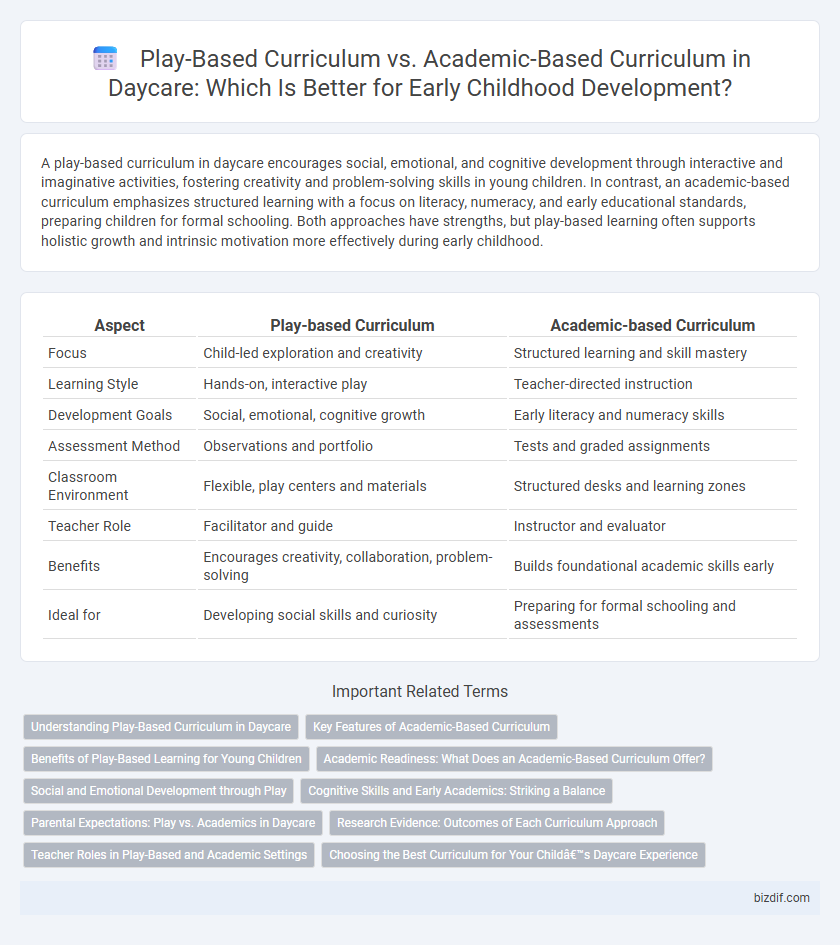A play-based curriculum in daycare encourages social, emotional, and cognitive development through interactive and imaginative activities, fostering creativity and problem-solving skills in young children. In contrast, an academic-based curriculum emphasizes structured learning with a focus on literacy, numeracy, and early educational standards, preparing children for formal schooling. Both approaches have strengths, but play-based learning often supports holistic growth and intrinsic motivation more effectively during early childhood.
Table of Comparison
| Aspect | Play-based Curriculum | Academic-based Curriculum |
|---|---|---|
| Focus | Child-led exploration and creativity | Structured learning and skill mastery |
| Learning Style | Hands-on, interactive play | Teacher-directed instruction |
| Development Goals | Social, emotional, cognitive growth | Early literacy and numeracy skills |
| Assessment Method | Observations and portfolio | Tests and graded assignments |
| Classroom Environment | Flexible, play centers and materials | Structured desks and learning zones |
| Teacher Role | Facilitator and guide | Instructor and evaluator |
| Benefits | Encourages creativity, collaboration, problem-solving | Builds foundational academic skills early |
| Ideal for | Developing social skills and curiosity | Preparing for formal schooling and assessments |
Understanding Play-Based Curriculum in Daycare
Play-based curriculum in daycare centers emphasizes learning through structured play activities that foster creativity, social skills, and cognitive development in early childhood. This approach encourages exploration and hands-on experiences, supporting emotional and physical growth while allowing children to develop problem-solving abilities naturally. Research shows that play-based learning aligns with developmental milestones, promoting motivation and engagement more effectively than strictly academic-focused programs.
Key Features of Academic-Based Curriculum
The academic-based curriculum in daycare emphasizes structured learning with a focus on literacy, numeracy, and cognitive development through planned lessons and assessments. It incorporates standardized educational goals aiming to prepare children for formal schooling by enhancing skills such as reading, writing, and arithmetic. This curriculum often uses teacher-led instruction and progress monitoring to ensure measurable academic achievement in early childhood.
Benefits of Play-Based Learning for Young Children
Play-based learning in daycare promotes cognitive, social, and emotional development by engaging children in hands-on activities that stimulate creativity and problem-solving skills. This approach fosters natural curiosity and supports individualized learning paces, enhancing language acquisition and motor skills through interactive play. Research shows play-based curricula improve attention spans and collaboration abilities, laying a strong foundation for lifelong learning and academic success.
Academic Readiness: What Does an Academic-Based Curriculum Offer?
An academic-based curriculum in daycare emphasizes structured learning activities that develop early literacy, numeracy, and critical thinking skills essential for school readiness. This approach offers targeted instruction through lessons in reading, writing, and math, fostering cognitive development and enhancing children's ability to meet kindergarten expectations. Research shows children exposed to academic-focused programs tend to exhibit improved academic performance and smoother transitions into formal education settings.
Social and Emotional Development through Play
Play-based curriculum in daycare emphasizes social and emotional development by encouraging children to engage in cooperative activities, fostering empathy, self-regulation, and communication skills. This approach contrasts with academic-based curriculum, which prioritizes structured learning tasks and cognitive skills often at the expense of emotional growth. Research shows that play-based learning supports brain development critical for emotional intelligence and stronger peer relationships in early childhood.
Cognitive Skills and Early Academics: Striking a Balance
A play-based curriculum enhances cognitive skills by promoting creativity, problem-solving, and social interaction, essential for early brain development. An academic-based curriculum focuses on early literacy and numeracy, providing structured learning that supports foundational academic skills. Striking a balance integrates play with targeted academic activities, fostering both cognitive flexibility and early academic success in daycare settings.
Parental Expectations: Play vs. Academics in Daycare
Parental expectations in daycare often differ between favoring a play-based curriculum, which promotes social, emotional, and cognitive development through interactive and imaginative activities, and an academic-based curriculum that emphasizes early literacy and numeracy skills for school readiness. Parents seeking play-based programs prioritize holistic growth and creativity, while those leaning toward academic-based curricula value structured learning aligned with kindergarten standards. Balancing these expectations requires daycares to integrate developmentally appropriate practices that address diverse parental goals while supporting child-centered learning.
Research Evidence: Outcomes of Each Curriculum Approach
Research evidence indicates children in play-based curriculums demonstrate enhanced social skills, creativity, and problem-solving abilities compared to those in academic-based programs. Academic-based curriculums show strengths in early literacy and numeracy skills but may limit opportunities for imaginative exploration. Studies from the National Institute for Early Education Research highlight that play-based approaches better support holistic development and long-term academic success.
Teacher Roles in Play-Based and Academic Settings
In play-based daycare settings, teachers act as facilitators who guide children's exploration and social interaction, fostering creativity and critical thinking through hands-on activities. In academic-based environments, teachers primarily deliver structured lessons aimed at meeting specific learning milestones and assessing cognitive development. Both roles require adapting instructional strategies to support individual growth, but play-based educators emphasize child-led learning while academic settings prioritize curriculum objectives.
Choosing the Best Curriculum for Your Child’s Daycare Experience
A play-based curriculum fosters creativity, social skills, and emotional development by encouraging exploration and hands-on activities, making it ideal for early childhood growth. In contrast, an academic-based curriculum emphasizes structured learning and foundational skills in literacy and numeracy, preparing children for school readiness. Selecting the best curriculum depends on your child's unique needs, learning style, and developmental goals to ensure a balanced and enriching daycare experience.
Play-based curriculum vs academic-based curriculum Infographic

 bizdif.com
bizdif.com